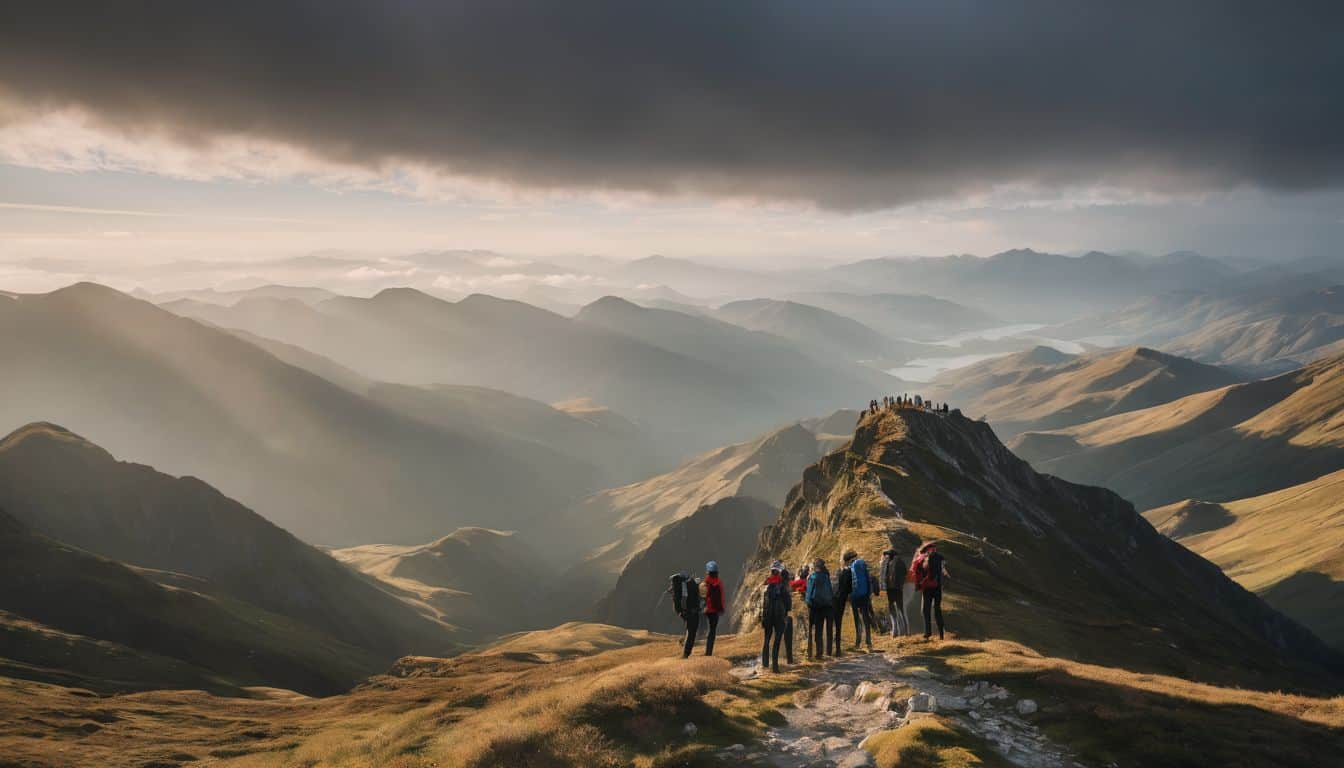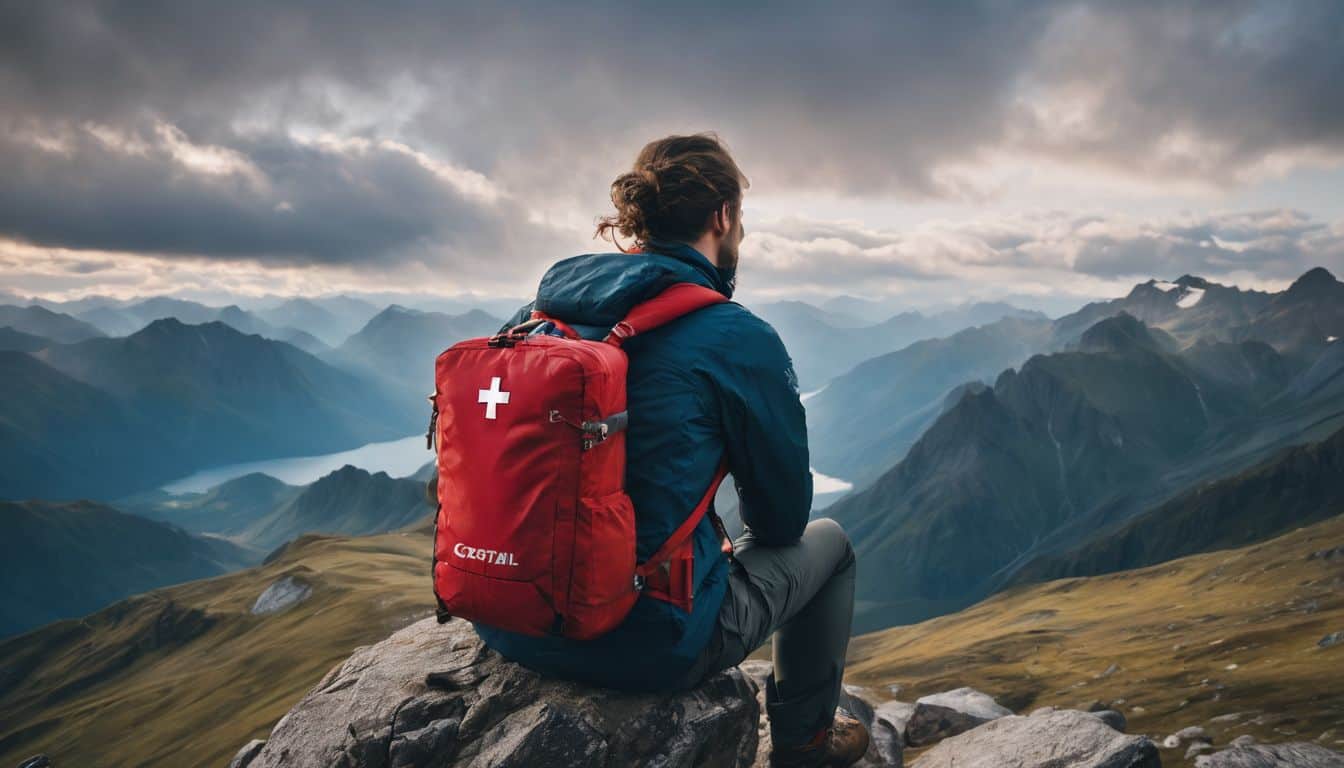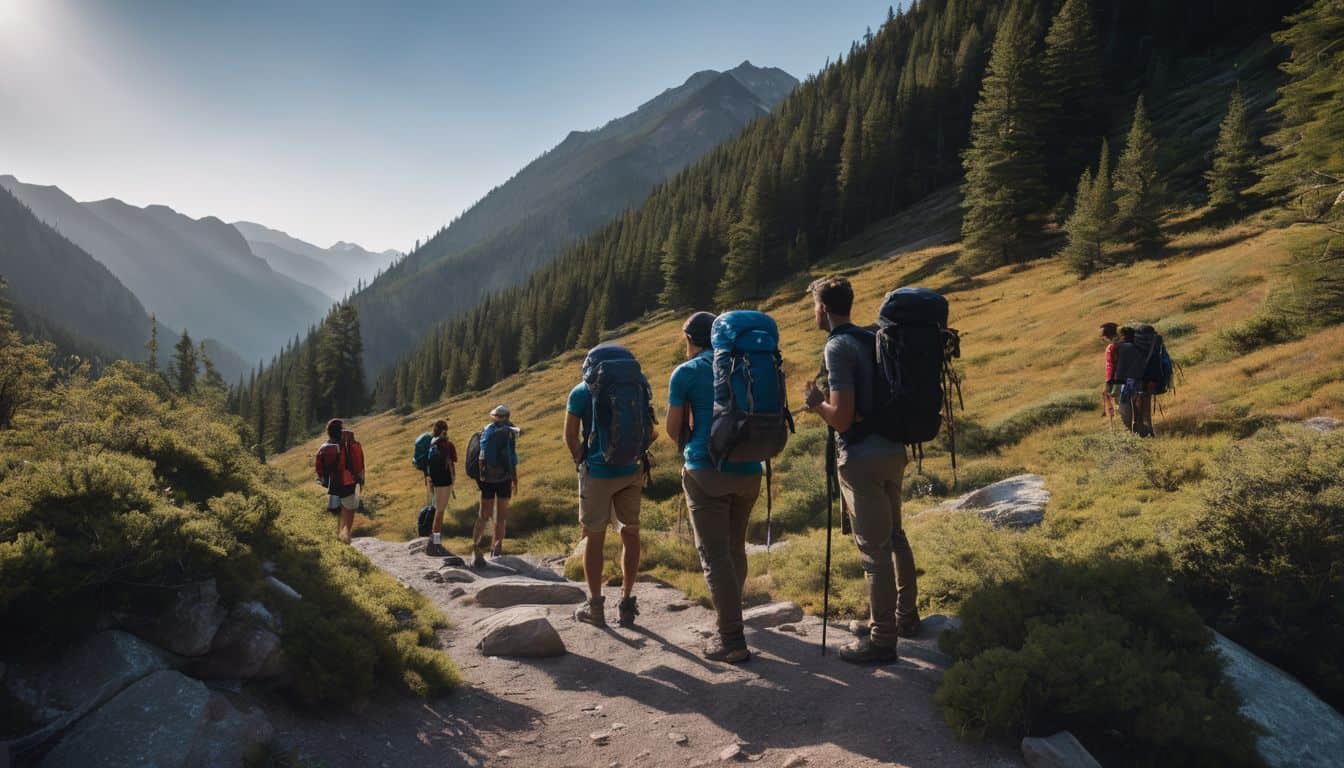Hiking – it’s an exhilarating journey, a dance with nature that often likes to step on your toes. As someone who genuinely appreciates the sweat against my backpack, and muddy boots at the end of a trail, I can vouch for the myriad of hiccups faced during these adventures.
After researching extensively and getting my hands (and shoes) dirty multiple times, I’ve found that overcoming these hindrances paves the way for a rush of accomplishment like no other.
This article aims to arm you with three key tips for mastering those pesky hurdles and supercharging your hiking experience. So are you buckled up to take on your next hike like a seasoned pro? Let’s dive right in!
Key Takeaways
- Hiking challenges can include difficult terrains, unpredictable weather conditions, and physical exertion, which can impact hikers physically and mentally.
- Setting goals is crucial for overcoming hiking challenges as they provide direction, motivation, and help measure progress and personal growth.
- Physical preparation through exercises and training techniques improves endurance and strength for handling demanding hikes.
- Mental preparation is important in developing a positive mindset to overcome stress, fear, and mental barriers on the trail.
Understanding Hiking Challenges
Hiking challenges can include difficult terrains, unpredictable weather conditions, and physical exertion, all of which can impact hikers both physically and mentally.
What are the main hiking challenges?
Hiking does have its tough parts. Some things can be hard to deal with. The ground may be rough and uneven. At times, the weather gets too hot or too cold, making it harder to walk.
Going up high places can also be a test for many hikers. We might come across wild animals unexpectedly while on a hike in the woods. Hiking isn’t just about being strong in your body though, it’s about your mind as well! Having fear or losing hope can make hiking even more tricky.
How do these challenges impact hikers?
Hiking challenges test me. They push my limits. I’m not just talking about physical strength or stamina. These hurdles can mess with my mind too. Self-belief and resilience are key to overcoming them.
Bad weather, tough terrains, and long trails can make me feel small and weak sometimes. But such obstacles also build up my toughness over time! Through these trials, I learn how hard I can push myself without breaking down physically or mentally.
This exploration of personal boundaries is a vital part of the hiking experience for me and many other hikers out there.
Importance of Setting Goals
Setting goals is crucial in hiking as they provide a clear direction and motivate hikers to overcome challenges, measure progress, and achieve personal growth.
Why is goal-setting important in hiking?
We need strong aims when we go hiking. They help us pick out trails and avoid hard ones that might tire us too much. Goals tell us what we need to do to get ready for the hike. They shape our actions and keep our drive alive.
We can set big goals or small ambitions in hikes. Both types matter, but small milestones stop us from getting tired while chasing big dreams!
How can goals help in overcoming challenges?
Setting goals is crucial for overcoming challenges in hiking. Goals give you something to strive for and help you stay focused on your objective, whether it’s reaching the summit of a mountain or completing a long-distance trail.
They provide direction and motivation, pushing you to keep going even when faced with difficult situations. By breaking down big challenges into smaller, more manageable tasks, goals enable you to tackle them one step at a time.
When you achieve your goals, it brings a sense of accomplishment and satisfaction that fuels your confidence and determination. Furthermore, setting goals helps you stay organized and prioritize your actions, ensuring that each step you take brings you closer to conquering the challenges that lie ahead on the hiking trail.
Guide to Hiking Challenges and Achievements
In this guide, I’ll share some helpful tips for overcoming hiking challenges and achieving your goals. Hiking can be a rewarding and exciting outdoor adventure, but it also presents its own set of challenges.
Whether you’re facing physical obstacles or mental barriers, these tips will help you navigate through them.
Firstly, physical preparation is key to mastering hiking challenges. It’s important to build up your endurance and strength before embarking on a difficult hike. Regular exercise and training techniques can help improve your fitness level and make the hike more enjoyable.
Additionally, don’t forget to pack essentials like water, snacks, and proper gear for the journey.
Secondly, mental preparation plays a crucial role in conquering hiking challenges. Developing a positive mindset will help you stay motivated during tough hikes. Techniques like deep breathing and focusing on the present moment can help manage stress and fear along the way.
Remember to take breaks when needed and listen to your body’s signals.
Lastly, acquiring essential hiking skills is vital for success on the trails. Navigation skills like map reading are essential for staying on track during hikes. Knowledge of wilderness survival skills can also come in handy in case of emergencies or unexpected situations.
Additionally, having basic first aid knowledge ensures that you’re prepared for any injuries or accidents that might occur.
By following these tips – physically preparing yourself, mentally gearing up for challenges, and acquiring necessary hiking skills – you’ll be well-equipped to overcome obstacles along your journey towards achieving your hiking goals!
Tip 1: Physical Preparation
Physical preparation is crucial for hiking, as it helps improve endurance and strength, ensuring hikers can handle the demands of challenging trails.
Importance of physical fitness for hiking
Physical fitness is crucial for hiking. When we hike, our bodies are put to the test as we navigate through challenging terrains and steep inclines. Additionally, hiking is a full-body workout that helps improve cardiovascular health, build endurance, strengthen muscles and bones, and promote overall physical conditioning.
It also has benefits for mental wellbeing. Regular hiking can help improve stamina, aid in weight loss and toning up, and enhance bone density. To make the most of your hiking experiences and overcome challenges along the way, it’s important to prioritize physical fitness through aerobic exercises and strengthening techniques.
So let’s get moving!
Exercises and training techniques for hikers
Physical preparation is crucial for successful hiking, and there are exercises and training techniques that can help hikers get ready. Here are some tips to consider:
- Start with simple bodyweight exercises like jumping jacks, squats, and leg raises. These require no special equipment or skill, making them accessible to everyone.
- Incorporate cardiovascular exercise into your routine, such as brisk walking, jogging, or cycling. This helps improve endurance and builds stamina for long hikes.
- Focus on muscle strength by doing exercises like pushups, chin-ups, and dips. These upper body strengthening movements will improve overall strength for carrying backpacks and navigating challenging terrains.
- Don’t forget about flexibility training! Stretching exercises like yoga or Pilates can increase flexibility and reduce the risk of injuries during hikes.
- Resistance training using resistance bands or weights can also be beneficial for building strength in specific muscle groups.
Tips for building endurance and strength
Building endurance and strength for hiking is important to ensure a safe and enjoyable experience. Here are some tips to help you improve your fitness level:
- Start with regular cardiovascular exercises, such as jogging or biking, to build stamina.
- Incorporate strength training exercises, like squats and lunges, to strengthen your lower body muscles.
- Practice hiking on varying terrains to simulate the challenges you may encounter on the trails.
- Gradually increase the intensity and duration of your hikes to build endurance over time.
- Stay hydrated and fuel your body with nutritious meals to support muscle growth and recovery.
- Consider cross – training activities, such as yoga or swimming, to improve flexibility and prevent injuries.
- Get enough rest between workouts to allow your body time to recover and adapt.
- Don’t forget about core strengthening exercises to improve balance and stability on the trails.
- Invest in proper gear, such as hiking boots and a backpack, to enhance comfort during long hikes.
- Listen to your body and adjust your training routine accordingly if you experience any pain or discomfort.

Tip 2: Mental Preparation
Developing a positive mindset is crucial for overcoming the mental challenges of hiking. Discover techniques to manage stress, stay motivated, and conquer your fears on the trail.
Developing a positive mindset for hiking challenges
When facing hiking challenges, developing a positive mindset is key. It helps us stay motivated, focused, and resilient throughout the journey. Having self-belief and a positive attitude can make a huge difference in how we overcome obstacles on the trail.
Techniques such as being adaptable, staying focused on our goals, and maintaining a positive outlook even in difficult situations can help us push through mental barriers. Building inner strength and endurance is just as important as physical preparation when it comes to conquering hiking challenges.
So remember to keep a positive mindset and believe in yourself every step of the way!
Techniques for managing stress and fear during hikes
Managing stress and fear during hikes can make your hiking experience more enjoyable and successful. Here are some techniques to help you stay calm and focused:
- Step into discomfort: Pushing yourself outside of your comfort zone can help you build resilience and overcome fear. Embrace the challenge and trust in your abilities.
- Practice mindfulness: Stay present in the moment by focusing on your surroundings. Take deep breaths, feel the ground beneath your feet, and observe the beauty of nature around you. This can help reduce stress and anxiety.
- Try something backwards: When faced with mental obstacles, approach them from a different perspective. Challenge negative thoughts by reframing them positively. For example, instead of thinking “I can’t do this,” say “I am capable of overcoming any challenge.”
- Build mental toughness: Cultivate a positive mindset by reminding yourself of past accomplishments or times when you persevered through difficulties. Visualize success and believe in your ability to overcome challenges.
- Use coping strategies: Prepare for hikes by planning ahead, knowing the route, and having necessary supplies. Practice self-care before and after hikes to manage emotional distress by engaging in activities that bring you joy and relaxation.
Mental strategies for staying motivated and focused
Staying motivated and focused while hiking can be challenging, but there are mental strategies that can help. Here are some tips for staying on track:
- Set clear goals: Having specific goals in mind can give you something to strive for and keep you motivated throughout your hike. Whether it’s reaching a certain viewpoint or completing a certain distance, having a goal in mind can keep you focused on the task at hand.
- Practice positive self-talk: Your mindset plays a big role in your hiking experience. Instead of dwelling on negative thoughts or doubts, try to encourage yourself with positive self-talk. Remind yourself of past achievements and the progress you’ve made along the way.
- Visualize success: Before heading out on your hike, take a moment to visualize yourself successfully overcoming any challenges that may come your way. Imagine yourself reaching your goals and enjoying the sense of accomplishment that comes with it. This can help boost your motivation and confidence.
- Take breaks when needed: It’s important to listen to your body and give yourself breaks when needed. Pushing through fatigue or physical discomfort can lead to burnout and lack of focus. Taking short breaks to rest, hydrate, and refuel can help refresh your mind and keep you motivated.
- Stay present and mindful: Instead of getting caught up in worries about the future or regrets about the past, try to stay present in the moment while hiking. Pay attention to your surroundings, take note of the beauty around you, and appreciate each step you take towards achieving your goals.

Tip 3: Essential Hiking Skills
Develop navigation skills and learn how to read maps, as well as acquire wilderness survival skills and knowledge of first aid and emergency preparedness.
Navigation skills and map reading
As a hiking enthusiast, one of the essential skills you should develop is navigation and map reading. Understanding how to interpret maps and navigate using a compass is crucial for your safety and enjoyment while on the trails.
With these skills, you can confidently explore new routes, stay on track, and find your destination easily. Remember that there are many resources available online or in field manuals that provide detailed tutorials on navigation techniques, map interpretation, and even outdoor adventure apps that offer reliable navigation tools.
So take the time to learn these skills and equip yourself with the knowledge needed for successful hiking adventures.
Wilderness survival skills
When hiking in the wilderness, having basic survival skills is crucial for your safety and well-being. Knowing how to start a fire can provide warmth, help you cook food, and even signal for help if needed.
Gathering firewood and understanding different fire-building techniques are essential for success. Additionally, learning how to construct an improvised shelter using natural materials can protect you from the elements.
Mastering knot tying techniques is also important for securing shelters and creating tools as well as addressing first aid needs. Lastly, developing mountain navigation skills will ensure that you can explore safely while enjoying a successful hiking experience.
First aid and emergency preparedness
When hiking, it’s important to be prepared for emergencies and know basic first aid skills. As a hiker, I understand the importance of knowing how to handle injuries and being ready for unexpected situations.
One essential skill is wilderness first aid. This includes learning how to stabilize a spine in case of an injury, controlling bleeding, and using the RICE method (rest, ice, compression, elevation) for sprains or strains.
It’s also crucial to have a well-equipped first-aid kit with items like bandages, adhesive tape, antiseptic wipes, and pain relievers. I always make sure to carry my backpacking essentials including my first-aid supplies whenever I hit the trails.
Overcoming Hiking Challenges
To overcome hiking challenges, it is important to develop strategies for both physical obstacles and mental barriers.
Strategies for overcoming physical challenges
Overcoming physical challenges while hiking is crucial for a successful and enjoyable experience. Here are some strategies to help you overcome these challenges:
- Build your physical endurance: Regular exercise and cardio workouts can strengthen your muscles and improve your stamina. Incorporate activities like jogging, swimming, or cycling into your routine to prepare your body for long hikes.
- Manage backpack weight: Reduce the weight of your backpack by packing only essential items. Prioritize lightweight gear and opt for compact options whenever possible. Distribute the weight evenly and adjust your pack’s straps for a comfortable fit.
- Take breaks and pace yourself: Hiking can be demanding on the body, so it’s important to take regular breaks to rest and recharge. Avoid pushing yourself too hard and maintain a steady pace that suits your fitness level. Listen to your body and adjust accordingly.
- Stay hydrated and fuel up: Drink plenty of water throughout the hike to avoid dehydration. Pack nutritious snacks that provide sustained energy, such as trail mix, granola bars, or dried fruits.
- Protect against injuries: Wear appropriate footwear with good ankle support to prevent sprains or strains. Use trekking poles to reduce strain on your knees while hiking downhill. Warm-up before starting and stretch afterwards to prevent muscle soreness.
Techniques for overcoming mental barriers
Overcoming mental barriers is a crucial part of mastering hiking challenges. It takes mental strength and determination to push through when things get tough. Here are some techniques that can help you overcome those mental barriers:
- Develop a positive mindset: Train your mind to focus on the positive aspects of your hike. Remind yourself of why you love hiking and the sense of accomplishment you’ll feel when you conquer challenges.
- Practice stress management: Hiking can be physically and mentally demanding, so it’s important to have strategies to manage stress. Deep breathing exercises, meditation, or listening to calming music can help calm your mind during difficult moments.
- Set mini-goals along the way: Breaking down your hike into smaller goals can make it seem more achievable. Celebrate each milestone you reach, whether it’s reaching a certain distance or conquering a challenging trail section.
- Visualize success: Before embarking on your hike, visualize yourself overcoming obstacles and successfully completing the challenge. This positive visualization can increase your confidence and motivation.
- Surround yourself with supportive people: Hiking with like-minded individuals or joining hiking communities can provide support and encouragement when faced with mental barriers. Sharing experiences and learning from others’ successes can boost your own resilience.
Importance of perseverance and resilience
Perseverance and resilience are crucial qualities to have when facing hiking challenges. They help us push through difficulties and keep going, even when the going gets tough. When we encounter steep inclines or rough terrain, perseverance allows us to keep moving forward and not give up.
We may stumble along the way, but with resilience, we can bounce back and continue our journey. These qualities are like a wellspring of strength that keeps us motivated, determined, and focused on reaching our goals.
With perseverance and resilience, we can conquer any hiking challenge that comes our way and experience the satisfaction of overcoming obstacles in both our hiking adventures and life in general.
Celebrating Hiking Achievements
Setting milestones and celebrating progress is crucial in hiking. It’s important to recognize personal growth and accomplishments along the way. Join me as we dive into inspiring hiking stories and learn valuable lessons from successful experiences.
Setting milestones and celebrating progress
As a hiker, setting milestones and celebrating progress is an important part of the journey. It helps you stay motivated and gives you a sense of accomplishment. Whether it’s completing a certain number of hikes in a year or reaching a specific destination, setting goals can provide direction and purpose.
When you reach these milestones, take the time to celebrate your achievements. Recognize how far you’ve come and the growth you’ve experienced along the way. Share your accomplishments with others in the hiking community, as they will understand and appreciate your hard work.
Remember that every step forward is worth celebrating!
Recognizing personal growth and accomplishments
Recognizing personal growth and accomplishments is an important aspect of celebrating hiking achievements. As hikers, we often face challenges that push us to our limits physically and mentally.
Overcoming these challenges not only builds our confidence but also helps us develop a growth mindset, where we believe in our ability to improve and succeed. When we acknowledge our progress and the milestones we’ve achieved along the way, it boosts our motivation and self-esteem.
By sharing our accomplishments with the hiking community, we inspire others while also reinforcing our own sense of achievement. So take a moment to reflect on how far you’ve come, celebrate your successes, and embrace the personal growth that comes from conquering hiking challenges.
Sharing achievements with the hiking community
One of the best parts about achieving hiking goals is being able to share your accomplishments with the hiking community. It’s a chance to connect with fellow hikers who understand the challenges you faced and can appreciate your hard work.
By sharing your achievements, you not only inspire others but also receive encouragement and support from like-minded individuals. Whether it’s through online forums, social media groups, or local hiking clubs, joining a community that celebrates hiking successes can boost your motivation and keep you excited about future adventures.
Remember that celebrating achievements isn’t just about receiving praise; it’s also an opportunity for personal growth and reflection. By sharing your experiences and lessons learned, you contribute to the collective knowledge of the hiking community and help others overcome their own challenges.
Inspiring Hiking Stories
Read real-life stories of hikers who have overcome incredible challenges and achieved remarkable feats in their hiking journeys. Learn valuable lessons from their experiences and be inspired to push your own boundaries on the trails.
Real-life stories of hikers overcoming challenges
Let me tell you about some amazing hikers I’ve come across who have overcome incredible challenges. These stories will inspire you and show you what’s possible when faced with obstacles on the trail.
One hiker named Sarah had always dreamed of thru-hiking the Appalachian Trail, a 2,200-mile journey from Georgia to Maine. She faced physical challenges like blisters and sore muscles, but also mental and emotional hurdles.
There were times when she wanted to quit, but she pushed through and found inner strength she didn’t know she had. In the end, Sarah completed the entire trail and said it was a lifechanging experience that taught her resilience and perseverance.
Another hiker, Mark, tackled an even bigger challenge: climbing Mount Everest. The physical demands of high altitude mountaineering are immense, not to mention the extreme weather conditions.
But Mark prepared himself mentally as well by practicing mindfulness techniques to stay calm in stressful situations. His determination paid off when he reached the summit and experienced a profound sense of accomplishment.
Lessons learned from successful hiking experiences
During my hiking journeys, I’ve learned valuable lessons that I want to share with you. One of the most important lessons is the power of collaboration. When we work together as a team, we can conquer any mountain or overcome any obstacle.
Long-distance thru-hiking has also taught me the virtues of patience, mindfulness, generosity, and forgiveness. It’s about embracing every moment and feeling fully alive in nature.
Another lesson is the importance of trusting my instincts and being confident in my choices while hiking. Mountains teach us perseverance, problem-solving skills, and the value of maintaining a positive attitude even when faced with challenges.
Conclusion on Hiking Challenges And Achievements
In conclusion, mastering hiking challenges and achieving success is possible with the right approach. By setting goals, preparing physically and mentally, and developing essential skills, hikers can overcome obstacles and celebrate their achievements.
Remember to stay motivated, persevere through difficulties, and always appreciate the personal growth that comes from conquering hiking challenges. Happy trails!
FAQs on Hiking Challenges And Achievements
1. What are some common hiking challenges?
Common hiking challenges include steep or difficult terrain, changing weather conditions, and physical fatigue.
2. How can I prepare for hiking challenges?
To prepare for hiking challenges, you can train by going on shorter hikes to build endurance and strength. It’s also important to research the trail beforehand, pack essential gear like proper footwear and clothing, and stay hydrated and nourished during the hike.
3. What are some achievements in hiking?
Achievements in hiking can include reaching a summit or peak, completing a long-distance trail like the Appalachian Trail, or conquering a challenging route that requires technical skills.
4. How can I master hiking?
To master hiking, it’s important to continue developing your skills through regular practice and experience. Learn from more experienced hikers, take courses on wilderness safety and navigation if needed, and gradually increase the difficulty of your hikes as you gain confidence.
5. Can anyone go hiking?
While anyone can attempt hiking, it is important to assess your fitness level and choose trails that match your abilities. Beginners should start with easier hikes before progressing to more challenging ones.





Leave a Reply